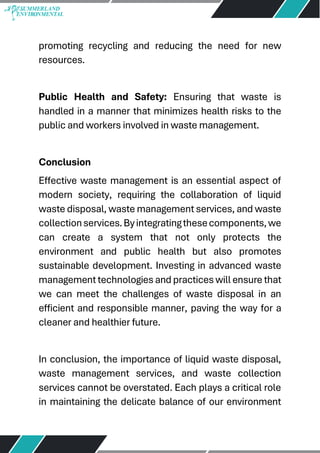4 Simple Techniques For Reclaim Waste
4 Simple Techniques For Reclaim Waste
Blog Article
Reclaim Waste for Dummies
Table of ContentsExcitement About Reclaim WasteOur Reclaim Waste StatementsThe Ultimate Guide To Reclaim WasteReclaim Waste Fundamentals ExplainedSee This Report about Reclaim Waste
Explore the kinds, occurrences, and forms of fluid waste. Domestic sewage waste refers to the waste and items from a household septic storage tank. This sort of waste is produced by human beings in residences, institutions, and various other structures. This only consists of septic systems that have a drainpipe field. The proper monitoring and disposal of domestic sewage waste call for fluid waste to be moved to a sewage therapy plant where the proper methods and equipment are put on detoxify and take care of waste.
Business waste usually includes possible risks, such as flammable materials or a blend of liquid and strong waste products, and calls for an advanced and detailed disposal procedure. The disposal of business waste generally includes the filtering of waste before transport to make certain risk-free and proper disposal. Industrial waste is produced from byproducts and drainage of industrial procedures and production.
This sort of waste can not make use of the very same sewage management transport or processes as septic or industrial fluids. The hazardous waste monitoring procedure requires the evaluation and screening of fluid waste before it undergoes the disposal process (liquid waste disposal melbourne). Overflow waste is the liquid waste that comes from drainage and excess stormwater in highly populated locations or cities
Overflow waste can trigger contamination and flooding otherwise managed appropriately. Discover more about drain cleaning and waste management. Making sure proper waste monitoring can avoid catastrophes and lower ecological injury. Both people in domestic setups and experts in commercial or production industries can take advantage of understanding the procedures and guidelines of liquid waste monitoring.
The Reclaim Waste Diaries
Contact PROS Services today to find out about our waste administration and disposal solutions and the proper methods to care for the liquid waste you create.
(https://www.mixcloud.com/reclaimwaste1/)Do you understand what takes place to your water when you disengage, purge the commode or drain pipes the cleaning maker? No? Well, it deserves knowing. This supposed 'wastewater' is not only an important source however, after treatment, will certainly be released to our land, waterways or the ocean. Utilized water from bathrooms, showers, baths, kitchen sinks, washings and commercial processes is referred to as wastewater.

water used to cool down equipment or tidy plant and tools). Stormwater, a kind of wastewater, is runoff that moves from agricultural and city areas such as roof coverings, parks, gardens, roadways, paths and gutters into stormwater drains, after rainfall. Stormwater streams without treatment directly to regional creeks or rivers, ultimately getting to the ocean.
Not known Facts About Reclaim Waste
In Queensland, the majority of wastewater is dealt with at sewage treatment plants. Wastewater is delivered from residential or commercial sites via a system of drains and pump terminals, known as sewerage reticulation, to a sewer treatment plant. Local federal governments construct, keep and run most sewage therapy plants. Operators are certified under the Environmental Security Act 1994 to release cured wastewater at an acceptable environmental requirement right into waterways.
The Department of Natural Resources recommends neighborhood federal governments about managing, operating and preserving sewerage systems and therapy plants. In unsewered areas, neighborhood governments may call for owners to install individual or house sewage therapy systems to deal with residential wastewater from bathrooms, cooking areas, washrooms and laundries. The Division of Natural Resources authorizes using house systems when they are shown to be effective.
In some new communities, treatment of some stormwater to get rid of litter, sand and crushed rock has begun utilizing gross contaminant catches. Wastewater therapy takes place in 4 phases: Removes strong issue.
Utilizes small living microorganisms knows as micro-organisms to damage down and remove staying liquified wastes and great particles. Micro-organisms and wastes are included in the sludge.
Reclaim Waste for Beginners
Nutrient elimination is not available in any way sewer therapy plants because it requires pricey specialist equipment. It is coming to be much more usual in Queensland. Clear liquid effluent created after treatment might still include disease-causing micro-organisms. If this effluent is launched into waterways such as rivers or the sea, the micro-organisms will eventually pass away out.

This generally implies wastewater needs to be dealt with or pollutants removed before it can be discharged to waterways. Most wastewater flows right into the sewage system. Under the Act, city governments carry out authorizations and licences for environmentally appropriate tasks (ERAs) including wastewater releases that may have a regional impact. The department administers authorizations and permits to ERAs including wastewater releases that might have a regional or statewide effect.
The Definitive Guide for Reclaim Waste
Or else, samples are considered laboratory evaluation. Often lots of tests are needed to establish the levels of each of the various toxins such as oils, heavy metals and pesticides in water. Tracking gives accurate information concerning water top quality and can validate that permit problems are being met. The details obtained via tracking supplies the basis for making water high quality decisions.
Report this page